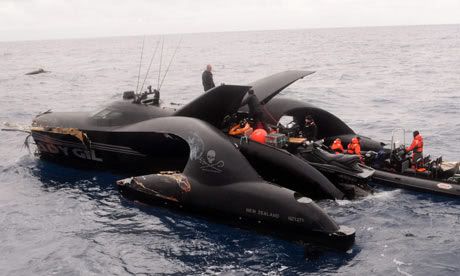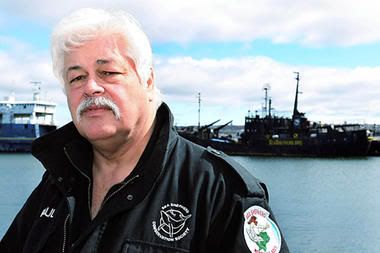
The damaged Ady Gil following its confrontation with a Japanese whaling vessel. Photograph: Sea Shepherd Conservation Society/EPA

Paul Watson, head of the Sea Shepherd Conservation Society, shown in this April 14, 2008 file photo, in Sydney, Nova Scotia..
The New Zealand government said on Thursday that whalers and anti-whaling protesters must now put a greater premium on human life.
New Zealand Foreign Minister Murray McCully said the clash must not be allowed to escalate.
"The New Zealand government is totally opposed to Japanese whaling taking place in the Southern (Pacific) Ocean, but we're also opposed to killing human beings down there as well," Radio New Zealand quoted McCully as saying.
"It's quite clear that unless there is some restraint exercise, there is serious risk to human life in that region at the moment," he added.
Maritime New Zealand will meet on Thursday to discuss how an investigation into the collision involving a protest boat and a Japanese security ship in Antarctica will proceed.
Japan's government-backed whaling fleet aims to harpoon up to 935 mink whales and 50 fin whales, classed as endangered, in the Southern Ocean this season, claiming it is for research purposes.
The Ady Gil collided with the security ship Shonan Maru No. 2 near Commonwealth Bay on Wednesday.
The New Zealand-registered vessel is the powerboat previously known as Earthrace, which set a world circumnavigation record.
The Sea Shepherd Conservation Society claimed the security ship rammed the protesters deliberately.
However, a group representing the Japanese whalers, the Institute of Cetacean Research, said footage of a crash showed the security ship was trying to avoid colliding with the Ady Gil.
The incident was filmed from the Shonan Maru No. 2 and showed that the Ady Gil was stationary, but began to move as the vessels came closer together.
The crash tore about 3 meters off the bow of the Ady Gil, but none of its crew members - five from New Zealand and one from the Netherlands - were hurt. They were rescued by the crew of the Sea Shepherd ship Bob Barker.
High Tech 2 million vessel damaged
The damage inflicted to the Sea Shepherd Conservation Society (SSCS) boat the Ady Gil in a collision with a whaling ship is likely to reignite the row over the environmental group's tactics.
Paul Watson, who helped set up Greenpeace in 1972, and now heads the SSCS has been labelled an eco-terrorist and dangerous extremist by his former comrades, with whom he is locked in a long-running feud.
While both groups have targeted the Japanese whale hunts in the Southern Ocean, Greenpeace refuses to co-operate with SSCS by sharing information on the whereabouts of whaling fleets because it says SSCS uses violent tactics. Watson counters this, saying his methods yield results and SSCS has sunk 10 whaling ships, with no injuries caused.
Watson was membership number 008 in Greenpeace. He founded SSCS's forerunner, the Earth Force Society, in 1977, the same year he was voted off Greenpeace's board of directors. There were concerns within Greenpeace over his methods, including an incident when he pulled a club from a sealer's hand and threw it in the water, but Watson claims he left on good terms. However, his departure only highlighted the groups' ideological differences.
In 1986, on being asked what he thought of being labelled an eco-terrorist by Greenpeace, Watson responded by calling them "the Avon Ladies of the environmental movement", something he says they have never forgiven him for. Five years later they agreed to refrain from criticising each other but the truce failed to hold, with each blaming the other for violating it.
The gloves really came off towards the end of 2008. In November of that year, Watson labelled his former organisation "Yellowpeace" for deciding not to send a ship to counter the Japanese whaling fleet. Greenpeace said its campaign had reached the "endgame" and it would instead concentrate on changing public opinion in Japan.
The following month it published a 2,672-word missive on Watson entitled Paul Watson, Sea Shepherd and Greenpeace: Some Facts. The article noted that "stories of divisiveness within the ranks of environmental groups distract from the real issues," but then went on to attack Watson on a variety of fronts, even challenging the idea that he was a founding member of Greenpeace, describing him instead as an "early member".
Watson hit back by issuing an even longer rebuttal. In response to Greenpeace's analysis that Japanese whaling would be stopped "by a domestic decision within the Japanese government to do so", he compared the group's attitude to that of "Jewish leaders in the Warsaw ghetto that resulted in the Holocaust".
Before the Ady Gil set sail for Antarctica in December, Watson told the Guardian that Greenpeace's claim he was not a founder member was "Bolshevik revisionism" and said his old organisation was bitter about the success of SSCS. "I think they're angry with us because of the success of Whale Wars [the hit TV series following SSCS in its Antarctic campaign in 2008], because we have actually made a difference," he said.
"We're not a protest organisation … we intervene against illegal activities and as far as we're concerned Japanese whalers are poachers."
Despite – or perhaps because of – his outspoken opinions, Watson has won the support of luminaries including the Dalai Lama, Mick Jagger, Daryl Hannah and Uma Thurman. SSCS even earned the dubious honour of being parodied in the US animated comedy South Park in an episode entitled Whale Whores, where its activists were depicted as "vegan pussies" posing as pirates and Watson got a harpoon through the head. Nevertheless, he proclaimed himself happy with the publicity.
At the beginning of Operation Waltzing Matilda, Watson talked up the impact the Ady Gil, formerly known as Earthrace, would have in confronting whalers. He said the boat, with a top speed of up to 50 knots (58mph) and able to dive under waves completely, would "give us the speed we need to intercept the harpooners. This vessel is twice as fast as a harpoon vessel".
But instead the $1.5m biodiesel-fuelled boat has come a cropper and the incident is likely to provide ammunition for those who criticise his methods.
----------
-----------
Read more about Whales




RELATED POSTS:-
- Eurostar train failed.Engineers desperate to find answers.-50,000 travelers affected by Eurostar break downs
- Climate talks deadlocked as clashes erupt outside
- 1000 detained as massive demostration in Copenhagen climate chance rally
- UK: W. Bank produce must be marked 'settlement' or 'Palestinian'- Isreal Protest for branding.Thousands Isreal protest on 10months stop construction.
- Clashes at Greek demos to mark teen's police shooting-70 people arrested.Tear gas shot to control crowd.
- Muslims will empty their Swiss accounts: Turkish minister
- Iraq reporter who throw shoe at Bush , get back own medicine.
- University of Calif. approves big fee hikes,$2,500 student fee increase -Student protests,pepper sprayed
- 1 dead, 5 hurt in CA Coast Guard boat collision
- Somali pirates say British couple taken to land-Somali pirates: Western boats 'loot' Somali fish
- Dozens missing from sunken ferry - Latests now only 3 dead and 80 missings.
- Filipina Ferry Sinks 60 still missing , 5 dead. Carrying 1000 people and unlisted dangerous cargo
- Beach tragedy: 125 pilot whales die stranded in New Zealand bay... but rescuers coax 43 back out to sea
- New Zealand calls for restraint after whaling clash
- Protests over horse 'cruelty' as equestrian fans threaten to boycott 2012 Olympics .Physical torture to subdue horse for balancing.
- Street justice, Chinese-style as vigilante launches his bicycle at bag-snatchers
- Pakistan government under pressure after deadly attack-Suicide bom kill 93 during volleyball match.Medical aid late to arrive.
- Protesters Gather on Gaza-Israel Border - A year since the 3 week war in Gaza
- The moment Iranian protesters cut down two prisoners from the gallows gun shots were heard , police car were seen , people with guns are seen.Mayhem
- Fears of bloody endgame in Iran as five are killed in street battles





0 comments:
Post a Comment